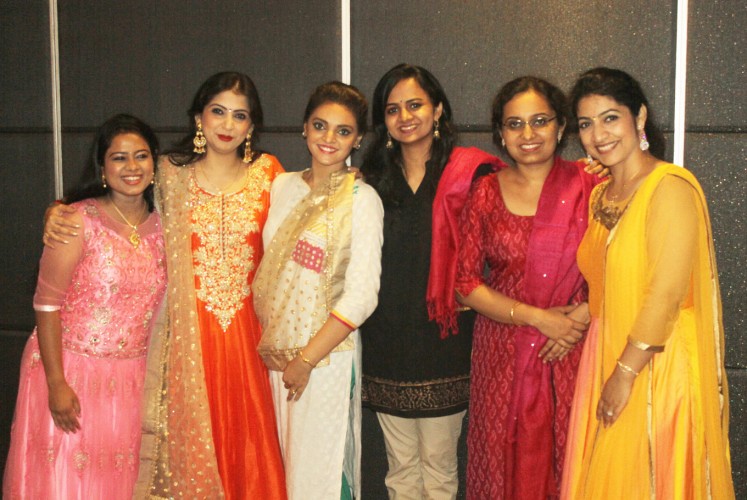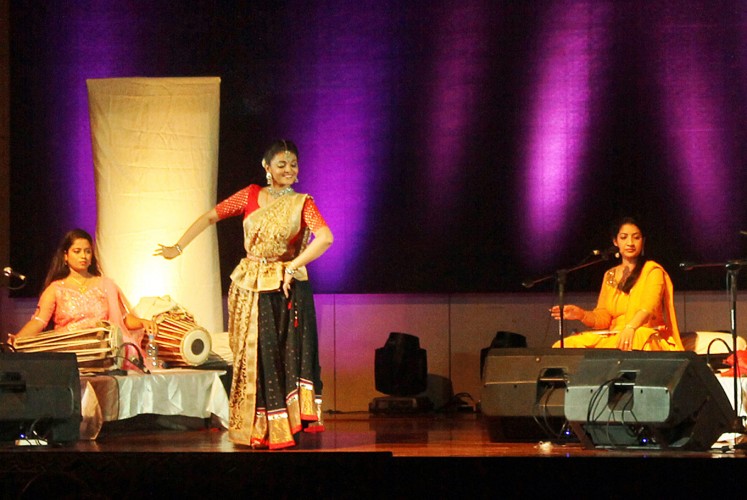Popular Reads
Top Results
Can't find what you're looking for?
View all search resultsPopular Reads
Top Results
Can't find what you're looking for?
View all search resultsSakhi: Bold and beautiful
A show that was not just aesthetically pleasant but also socially relevant in terms of female empowerment.
Change text size
Gift Premium Articles
to Anyone
Six-woman classical Indian music group Sakhi wowed a Jakarta audience during its debut performance in Indonesia.
The group, featuring Mahima Upadhyay on the pakhawaj percussion, Kaushiki Chakraborty on vocals, Nandini Shankar on violin, Debopriya Chatterjee on flute, Savani Talwalkar on tabla and Bhakti Deshpande, who responded to the music with her dance, staged a performance on Aug. 5 in an auditorium of the Tourism Ministry’s Sapta Pesona building in Central Jakarta.
The music, performed in a bold and beautiful manner during the concert, was rooted within the Indian classical and folk-music tradition.
Chakraborty said the concert’s main theme was celebrating the whole experience of womanhood, which has been marginalized due to a social structure that has been in place for many centuries.
The presentation opened with a song called “Naman,” which referenced the Indian tradition of seeking blessings from the Hindu Lord Ganesha to mark the beginning of any ceremony. True to the idea of representing womanhood, the song also honored the Hindu goddess of knowledge Devi Saraswati.
The song started with an intertwining violin and flute intro with gorgeous harmonies from Chakraborty. The music went by and her voice got louder with the tabla making way for the song’s buildup into a faster tempo. Deshpande danced faster in response to the tempo change.
The second and third songs, “Anandini” and “Udaan,” respectively, were full of unique vocal improvisation. In “Udaan,” in particular, Chakraborty’s vocals blended seamlessly with Chatterjee’s flute-playing, sending the audience into an otherworldly trance-like feel.
Troupe: The Sakhi ensemble poses for a photograph featuring (from left) Mahima Upadhyay (pakhawaj), Kaushiki Chakraborty (vocals), Bhakti Deshpande (dancer), Nandini Shankar (violin), Savani Talwalkar (tabla) and Debopriya Chatterjee (flute). (JP/Sebastian Partogi)“[Through the songs,] we try to incorporate all sides of womanhood, not just the soft and gentle side but also the powerful side, as well as the romance and the romantic longing. We want to include all possible emotions associated with being a woman within the songs we perform,” Chakraborty told The Jakarta Post after the concert.
A note on the powerful side; the fourth song called “Samanjasya” featured a very bold percussive duo performed by Talwalkar and Upadhyay.
Percussion has generally been regarded as a male preserve. In this number, as explained in the concert’s program book, Sakhi broke the stereotypical masculine reference and celebrated the magnitude of pakhawaj percussion alongside the subtle-yet-complex rhythmic combination of the tabla, to create an ambience of completeness and balance.
Both Talwalkar and Upadhyay showcased very strong percussive prowess, beating the pankaraj and tabla in a very energetic manner to produce well-rounded sound that reverberated throughout the hall.
In the fifth song, called “Kanjari”, dancer Deshpande took the center stage. The song, which sought to take the audience to an age “where courtesans entertained connoisseurs through the art of music or dance,” showcased a sentimental and emotionally charged dance by Deshpande, who also performed a few vocal lines.
Throughout the entire piece, the dancer sat at ease while evoking elements of the Kathak tradition to pay tribute to the unsung divas of Indian classical music. Unlike her previous dances, which showcased more energetic physical movements, here Deshpande communicated with the audience not just through her physical movements but also her subtle facial expressions and gaze.
Radiating: Bhakti Deshpande (right) communicates with the audience through her dance and facial expressions. (JP/Sebastian Partogi)The concert’s climax was the up-tempo and cheerful Indian folk song “Lokranjani,”
According to the program, the song depicted the strong bonds connecting the emotions of people. Indeed, the audience started to bond together non-verbally by clapping along spontaneously to the ensemble’s happy music.
The concert brought the audience into a myriad of emotional experiences: joy, sadness, transcendence, fascination for our mighty nature and very often, a mix of all these emotions. This diversity in terms of emotions evoked through the music is one of the central characteristics of Sakhi’s music.
“Our music is very diverse and it comes with its own shades, colors and textures to connect with a larger audience. We want to present a wider range of musical expressions inherent in Indian classical music, influenced by the natural and weather conditions of our society. Musical expression is pure and genuine,” Chakraborty said.
The group’s music also has a societal significance pertaining to the empowerment of women in different sectors as the male-biased patriarchal society starts to change with the rising socioeconomic status of women. Chakraborty said some decades ago, an all-female group performing male-dominated Indian classical music was unheard of, let alone a lady playing a percussion instrument like the tabla.
“This is why Sakhi represents a change in our society, representing the journey that women have made [toward empowerment],” she said.













